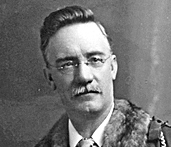[The Luton News editorial comment: Thursday, September 4th, 1919]
The Mayor of Luton attended the meeting of the Board of Guardians on Monday [September 1st], for the first time since the unfortunate happenings of July, took his place as chairman and made a statement as to his personal position. From this it appears that that he is still no better, that he is in fact so unwell that he does not feel the slightest interest in public matters at present, and that “he does not expect that he will be able to take part in public matters for a few years”.
The following day Mr Impey attended the Town Council, and explained that his health was such that he would be compelled to give up all public work as from November next.
 We greatly regret that Mr Impey's health should have been so much impaired by the experience through which he went in July, but it is not from that point of view alone that we think he is doing the right thing in giving up his municipal work. Indeed, we go further, and say that he would have better consulted his own dignity had he placed himself unreservedly in the hands of his colleagues immediately after the unhappy events in connection with the Peace celebration.
We greatly regret that Mr Impey's health should have been so much impaired by the experience through which he went in July, but it is not from that point of view alone that we think he is doing the right thing in giving up his municipal work. Indeed, we go further, and say that he would have better consulted his own dignity had he placed himself unreservedly in the hands of his colleagues immediately after the unhappy events in connection with the Peace celebration.
The Mayor's explanation of the circumstances attending the arrangements for the celebration did nothing to put the action of the authorities in a better light. Doubtless they meant well, but they bungled badly.
Mr Impey (pictured) says that in the first week in July Lady Wernher had intimated that she would entertain the returned soldiers and leave it to the Council to deal with the children. Then why in the world was that not made public at the time? Who was responsible for the deplorable blunder of keeping the information?
All that people knew was that a certain programme had been arranged. That it included a banquet at 15 shillings a head, but nothing for the soldiers, and that the children might be entertained on some future date.
As to the decision in regard to the use of Wardown for a drumhead memorial service, the less said about it the better. It was a ghastly mistake, and the only thing is to leave it at that.
The most significant feature in connection with Mr Impey's statement was the silence with which it was received. Only one councillor ventured to interpose a remark, and it was characteristic of a man who for some time past has shown himself strangely out of touch with the Luton of today. Public representatives are entitled to exercise their own discretion and form their own views on the matters coming before them, but if they deliberately flout public opinion, they also must disappear from the public service – when November comes.
The next thing the Council will be concerned about – that is if they do not fall in with the resolution passed at the Plait Hall meeting [of ratepayers] – is the choice of a Mayor for the ensuing year. Now we do not hesitate to say that the only satisfactory way in which to proceed is to elect a man on his merits, and not because it is his turn.
It is the welfare of the town that has to be considered, not the aspirations of the individual. The talk about 'letting the honours go round' is mischievous from beginning to end. Men ought not to enter public life in pursuit of honours, but for the sake of serving their day and generation.
When the claims of the individual run counter to efficiency of administration, can there be any doubt as which ought to be sacrificed?

